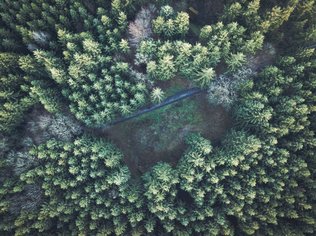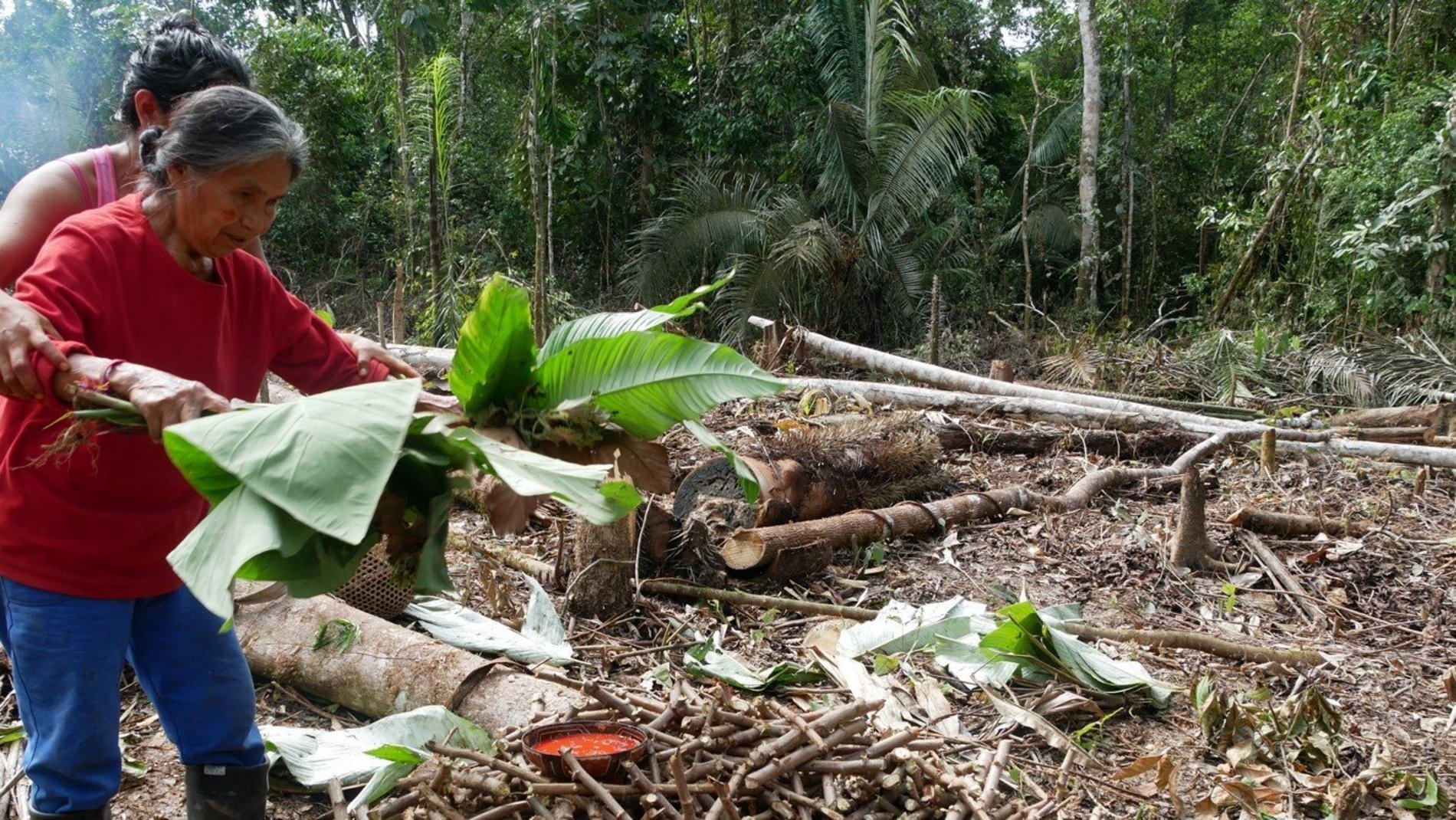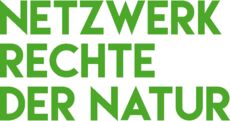
Rights of Nature and German civil society
by Elena Ewering, University of Kassel
Rights of nature are a legal reality in many countries around the world and - since the Spanish saltwater lagoon Mar Menor was recognised as a legal entity – also in Europe. In view of the ever-worsening ecological crises of our time, the idea of Rights of Nature (RoN) has met with increasing resonance in Germany in recent years – both at the levels of civil society and academia.
RoN question our anthropocentric legal and social system and offer the opportunity to overcome the dichotomy between humans and nature in order to achieve social change towards a more environmentally friendly way of living. The work of German civil society actors is one of the decisive factors in realising the concept of RoN in Germany. Their approaches are numerous and diverse.
Legal proceedings
Granting subjective rights to natural entities and making them parties to legal proceedings is not an entirely new idea in Europe. In the Middle Ages, animals were already granted subjective rights, and their rights and duties were negotiated before courts. In more recent decades, two court proceedings initiated by civil society actors, again concerning animal rights, have caused a stir: In the 1980s, 90% of the entire seal population in the North Sea had died, presumably due to the dumping of dilute acid on the high seas, which was common practice at the time. In the so-called "Robbenklage 1988" (Seal Lawsuit), the environmental organisations AKN, BUND, BBV, DNR, Greenpeace, Robin Wood and the WWF attempted to obtain legal protection on behalf of the North Sea seals before the Hamburg Administrative Court. The court rejected the application as inadmissible. However, public interest in the case was strong and licences for the dumping of dilute acid were subsequently no longer granted - an example of how strategic litigation can lead to actual success even in "hopeless" cases.
The animal rights organisation PETA used a similar approach in 2019: it lodged a constitutional complaint on behalf of male piglets, arguing that castration without anaesthesia violated the piglets' fundamental rights. According to their argument, fundamental rights at least partly apply to pigs as well. However, the constitutional complaint was not admitted (BVerfG, decision of 14 May 2021, 1 BvR 2612/19).
Legislative initiatives
Civil society actors of RoN in Germany are currently first of all campaigning for the inclusion of RoN in legal texts.
The Bavarian initiative Rechte der Natur - Das Volksbegehren (hereinafter: referendum) is already running since September 2021. Since then, supporters have been collecting signatures for a petition for such a referendum. The aim is to amend Article 101 of the Bavarian state constitution. The existing wording is to be expanded to include the following additions (in bold):
"Everyone shall have the freedom to do whatever does not harm the rights of others and rights of the co-natural world within the limits of the laws and the morality."
The term “co-natural world” (“Mitwelt”) is not commonly used internationally; it is used here as a synonym for “nature”.
What is meant exactly by these „rights of the co-natural world“ is not defined in more detail and requires interpretation as well as - ultimately - implementation through legislation. However, a certain independent content will be inherent, as the provision would otherwise be meaningless. Taking into account Art. 141 of the Bavarian state constitution, which allows, amongst others, the 'enjoyment of natural beauty and recreation in the outdoors', it can be assumed that the co-natural world has a right to exist. Generally, the initiators of the referendum see their proposal primarily as a mandate to the legislative power to take action.
At a national level, the Netzwerk Rechte der Natur (Network Rights of Nature; hereafter called ‚network‘) published its proposals for a fundamental rights reform in 2022. The network was formed in 2008 on the initiative of Dr Georg Winter under the name "Network Rights of Nature and Economy" and was - remarkably - mainly supported by environmentally oriented representatives of economics. They viewed RoN as a decisive factor in the pursuit of a sustainable economy and the realisation of human rights. Building on these existing structures, the current network was founded in 2020. In a two-year consultation process, involving a wide range of people and academics from various disciplines, they crafted a proposal to amend the German Basic Law. Amongst others, they proposed to add the following paragraph to Article 1 of the German Basic Law:
"The dignity of nature requires that the natural foundations of life be protected, cared for and preserved and that the intrinsic value of the co-natural world be respected in the whole of nature."
This amendment to the Basic Law is intended to oblige the German state to protect nature for its own sake and to take responsibility for future generations.
Last but not least, in his ground-breaking proposal "Das ökologische Grundgesetz" ('The ecological basic law'), Prof Jens Kersten clarified that an amendment to the German Grundgesetz would bring the most far-reaching successes on the path towards an ecological society. However, as such an amendment faces high barriers, the referendum seems more promising - at least for the near future (this, too, involved some issues, which can, however, be solved more easily).
Irrespective of their feasibility, the proposals described above generally do offer an opportunity to convey a far-reaching idea of nature conservation to a wider public in Germany.
Networking and communicating the Rights of Nature
The association Rechte der Natur e.V. represents another actor working on RoN in German civil society. Founded in 2022 by a group of young lawyers, it implements its own projects, and aims to serve as a platform for the existing civil society engagement for individual ecosystems and the growing movement of RoN – as much as the network (described above). Furthermore, both the network and the petition for a referendum (Volksbegehren) are in close contact with academics from a wide range of disciplines.
In addition to joining forces within Germany, the network and the referendum have used various forms of mobilisation and information to reach out to as many people as possible. These include for instance information stands, theatre and music events, panel discussions, lectures, workshops, expert dialogues and interviews. The referendum recently received international attention when its initiator Hans Leo Bader spoke at the 12th Interactive Dialogues of the General Assembly of the UN Harmony with Nature programme.
The social commitment to the RoN in Germany has recently gained momentum, and both the network and the referendum are receiving more and more coverage in German media – as for instance in the Frankfurter Rundschau and the magazine Spektrum. The campaign for RoN is thus also bearing fruit in Germany.
Elena Ewering is a legal scholar and research associate in the DFG project "Nature as a Legal Person" in the Department of Just Transitions at the University of Kassel.
Programmes & Initiatives
- UN Harmony with Nature http://www.harmonywithnatureun.org/rightsOfNature/
- Rechte der Natur – Das Volksbegehren https://gibdernaturrecht.muc-mib.de/vb_bayern
- Netzwerk Rechte der Natur https://www.rechte-der-natur.de/
- Rechte der Natur e.V. https://rechte-der-natur.org
Literature
- Ewering, Elena & Gutmann, Andreas. „Gibt Bayern der Natur Rechte?“ Verfassungsblog. Online: https://verfassungsblog.de/gibt-bayern-der-natur-rechte/
- Ewering, Elena & Vetter, Tore (2021). „Invisibilising Nature. Procedural Limits and Possibilities to Environmental Litigation in German Law.“ 54 VRÜ 3, pp. 376-397.
- Fischer-Lescano, Andreas (2020): „Nature as a Legal Person: Proxy Constellations in Law, Law & Literature.“ Law & Literature, pp. 237-262.
- Gelinsky, Katja (2021). „Die Natur als Person?“ Die politische Meinung, pp. 76-81.
- Gutmann, Andreas (2021). Hybride Rechtssubjektivität, Die Rechte der Natur oder Pacha Mama in der ecuadorianischen Verfassung von 2008. Nomos.
- Gutmann, Andreas (2022). „Der Nebelwald als Rechtssubjekt.“ KJ 27, pp. 31 f.
- Kersten, Jens (2020). „Natur als Rechtssubjekt.“ ApuZ 11, pp. 27-32.
- Kersten, Jens (2022). Das ökologische Grundgesetz. Beck.
- Kramm, Matthias (Ed.; 2023). Rechte für Flüsse, Berge und Wälder. Oekom.
- Mayer-Abich, Klaus M. (1990). Aufstand für die Natur. Von der Umwelt zur Mitwelt. Hanser.
- Mührel, Jaspar (2021). „Standing for Piglets.“Verfassungsblog. Online: https://verfassungsblog.de/standing-for-piglets/ (27.10.2023).



